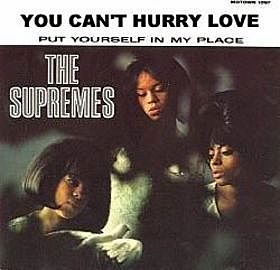
"You Can't Hurry Love" is a 1966 song originally recorded by the Supremes on the Motown label. It was released on July 25 of 1966 as the second single from their studio album The Supremes A' Go-Go (1966).
A marina is a place for docking pleasure boats.

"Itsy Bitsy Teenie Weenie Yellow Polka Dot Bikini" is a novelty song telling the story of a shy girl wearing a revealing polka dot bikini at the beach. It was written by Paul Vance and Lee Pockriss and first released in June 1960 by Brian Hyland, with an orchestra conducted by John Dixon. The Hyland version reached number one on the Billboard Hot 100, selling a million copies in the US, and was a worldwide hit. The song has been adapted into French as "Itsy bitsy petit bikini" and into German as "Itsy Bitsy Teenie Weenie Honolulu-Strand-Bikini", reaching number one on national charts in both languages. Several versions of the song have proved successful in various European countries. In 1990 a version by British pop band Bombalurina, titled "Itsy Bitsy Teeny Weeny Yellow Polka Dot Bikini", reached number one on the UK Singles Chart and in Ireland.
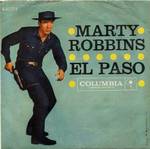
"El Paso" is a western ballad written and originally recorded by Marty Robbins, and first released on Gunfighter Ballads and Trail Songs in September 1959. It was released as a single the following month, and became a major hit on both the country and pop music charts, becoming the first No. 1 hit of the 1960s on both. It won the Grammy Award for Best Country & Western Recording in 1961. It is widely considered a genre classic for its gripping narrative which ends in the death of its protagonist, its shift from past to present tense, haunting harmonies by vocalists Bobby Sykes and Jim Glaser and the eloquent and varied Spanish guitar accompaniment by Grady Martin that lends the recording a distinctive Tex-Mex feel. The name of the character Feleena was based upon a schoolmate of Robbins in the fifth grade, Fidelina Martinez.
"Memories Are Made of This" is a popular song about nostalgia, written in 1955 by Terry Gilkyson, Richard Dehr, and Frank Miller. They were the members of a three-pieced group called "The Easy Riders", who served as a backing band for Dean Martin's version of this song, also released in 1955.
"Theme from A Summer Place" is a song with lyrics by Mack Discant and music by Max Steiner, written for the 1959 film A Summer Place, which starred Sandra Dee and Troy Donahue. It was recorded for the film as an instrumental by Hugo Winterhalter. Originally known as the "Molly and Johnny Theme", this lush extended cue, as orchestrated by Murray Cutter, is not the main title theme of the film, but an oft-heard secondary love theme for the characters played by Dee and Donahue. The theme has become a canonical representation of the easy listening genre, and is considered by some to be the definitive easy listening track of all time.

"Smoke Gets in Your Eyes" is a show tune written by American composer Jerome Kern and lyricist Otto Harbach for the 1933 musical Roberta. The song was sung in the Broadway show by Tamara Drasin. Its first recorded performance was by Gertrude Niesen, who recorded the song with orchestral direction from Ray Sinatra, Frank Sinatra's second cousin, on October 13, 1933. Niesen's recording of the song was released by Victor, with the B-side, "Jealousy", featuring Isham Jones and his Orchestra.
Bruce & Bongo was a 1980s Germany-based British pop duo best known in Europe for the hit single "Geil". The duo consisted of musician/singer Bruce Hammond Earlam and musician/singer Douglas "Bongo" Wilgrove, both from England.

"I Will Follow Him" is a popular song that was first recorded in 1961 by Franck Pourcel, as an instrumental titled "Chariot". The song achieved its widest success when it was recorded by American singer Little Peggy March with English lyrics in 1963. The music was written by Franck Pourcel and Paul Mauriat. It was adapted by Arthur Altman. The completely new English lyrics were written by Norman Gimbel.

"Everybody's Somebody's Fool" is a song written by Jack Keller and Howard Greenfield that was a No. 1 hit for Connie Francis in 1960. A polka-style version in German, "Die Liebe ist ein seltsames Spiel", was the first German single recorded and released by Connie Francis, and it reached No. 1 on the single chart in 1960 in West Germany.
"Why" is a hit song recorded by Frankie Avalon in 1959. It reached No. 1 on the U.S. Billboard Hot 100 chart published on the week of December 28, 1959. It was Avalon's second and final No. 1 hit.

"Amor", also known as "Amor Amor" and "Amor Amor Amor" is a popular song published in 1943.
Edith "Ditta" Einzinger was an Austrian pop singer who recorded under the stage name Lolita.
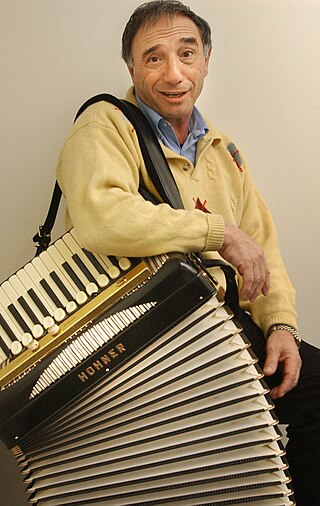
Rocco Granata is an Italian-Belgian singer, songwriter, and accordionist.
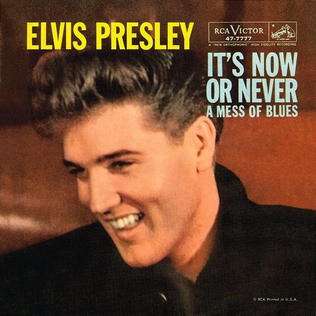
"It's Now or Never" is a song recorded by Elvis Presley and released as a single in 1960. The song is one of the best-selling singles by Presley, and one of the best-selling physical singles of all time. It was recorded by Bill Porter at RCA Studio B in Nashville. It is written in E major and has a tempo of 80 BPM.
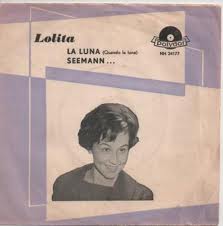
"Seemann (Deine Heimat ist das Meer)" (English translation "Sailor (Your Home is the Sea)") is a song originally written in German by Werner Scharfenberger (de) and lyricist Fini Busch (de). A 1959 German-language recording by Lolita became an international hit in 1960–61.
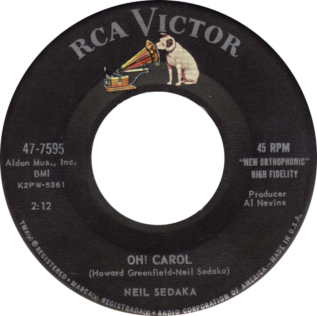
"Oh! Carol" is an international hit written by Neil Sedaka in 1958. Co-written with Howard Greenfield, the song is noted for Sedaka's spoken recitation of the verse, the second time around.

Marina is a biographical film released in 2013 and directed by Stijn Coninx. The film is based upon the life of the Italian singer Rocco Granata who moved to Belgium when he was a young boy. It features Matteo Simoni as Rocco Granata and Evelien Bosmans as Helena. Most part of the film is in Italian as Rocco's parents did not speak the Dutch language. Other parts are in Dutch and some dialogues in French and English.
"Sailor" is the title of the English-language rendering of the 1959 schlager composition "Seemann " originally written in German by Werner Scharfenberger and lyricist Fini Busch : featuring lyrics in English by Norman Newell, "Sailor" would in 1961 afford Petula Clark her first UK #1 hit, simultaneously granting Top Ten success to Anne Shelton while also bringing her chart career to a close. Clark was also afforded international success with both her recording of "Sailor" and also with Marin the French-language rendering of the song.

"Uno tranquillo" is a song by Italian singer Riccardo Del Turco, released as a single in 1967. It was not as successful as his previous single, "Figlio unico", which was a top-ten hit in Italy, and "Uno tranquillo" only peaked at number 21. However, the song is notable for being covered in English as "Suddenly You Love Me" by the Tremeloes and in French as "Siffler sur la colline" by Joe Dassin.













